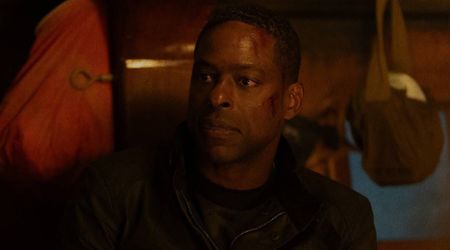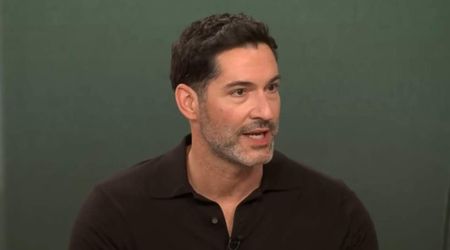Richard Stratton talks about the enigma of Gotti Sr and reveals why his new docu-series is not just another mob story

John Gotti Sr, the man who ruled over New York City's feared and often-times revered Gambino crime family in the 1980s, is a legend. He has been immortalized in many mob movies and TV shows; he has been the inspiration behind many a mob boss and many have tried to capture his essence in documentaries, as well.
However, what sets the docu-series 'GOTTI: Godfather & Son' apart from all of them is the subject matter itself. It is about Gotti Sr., but the show would not have seen the light of the day, had it not been for John Gotti Jr quitting the mob.
As Richard Stratton, the filmmaker and writer who made 'GOTTI: Godfather & Son' a reality tells Meaww, "I never would have made this if it weren’t for the fact that John Jr. hadn’t decided to quit because that is the only thing that makes it interesting to me. Otherwise, it is just another mob story - and you know, a lot of them have been done. There have been so many other documentaries about John Gotti Sr. but this the first time we have really looked at a father-son relationship. And, that’s what fascinated me, the father-son relationship set in the world of organized crime."
As Stratton puts it, "no one really knew him like his son, like his wife and like his daughter and the people who were close to him."
In fact, the very reason the series is being made decades after his release from the prison is simply because Gotti Jr. only recently got acquitted by the government. "He was tried four different times and they were unable to convict him and they finally said enough and dropped the charges and let him go," Stratton elaborates, adding "That and the fact that he chose to quit the mob, he chose to leave the mafia and lead a gentleman’s life and become a citizen. That is what inspired me to make this film."
'The Sopranos,' for example, has tried to emulate Gotti Sr in a way, and it is, as Stratton puts it, a "fantastic TV show – probably the best TV show that changed the whole scope of television because it had a real bad character who is the hero." However, he claims that the Sopranos relied on "TV magic" to make the "mafia stuff" more appealing to the audience. According to him, that part of the show was not particularly accurate.
Stratton met Gotti Sr. while they were both in prison in the 80s. The 70-year-old writer was imprisoned for eight years, from 1982 until 1990. "It was at a place called the Metropolitan correction center. It is the federal holding facility here in Manhattan. El Chapo is there now. It is where pretty much where all the criminals at the time would eventually end up," explains Stratton.
The most memorable thing about Gotti Sr, Stratton explains, is his charm. "He played the role of a gangster to the hilt but he did it with such a way that had a lot of humor and charm," relates Stratton, adding, "He was very amusing, very personable and very charming."
"The memory that stays with me is how personable he was, how friendly, how outgoing and charming and funny," reiterates Stratton, further elaborating that Gotti Sr. had seemed very intelligent and aware about his surroundings and the people he was in contact with – unusually so.
"I don’t know if that is something that came from years of being in the mob and having to be careful about his surroundings and who his people were around him," says the best-selling writer, further speculating that the fact that he was the youngest of 13 children growing up in a very, very poor family, made him particularly aware of his surroundings.
Stratton seems to have truly understood the essence of who Gotti Sr. was, despite the aura that surrounds him and the legend that preceded him. This is precisely why the Gotti family welcomed the idea of docu-series helmed by Stratton.
"I had to get the respect of the Gotti family. It wasn’t all that difficult because I had a relationship with the father. The family appreciated the fact that I knew the father," he says, adding, "And I met the rest of the family during John Jr’s trial in the southern district of New York in the federal court here. So, I got to know them while the son was on trial so it wasn’t difficult to become trusted by them."
Trust intact, the family was able to process a lot of their emotions through this film as well. Stratton talks about his conversations with the family pertaining to Frankie, one of the children of the family, who was run over by a car. The family revisited the understandably emotional moments, which was especially so for John Jr, who regretted not letting his little brother hang out with him more.
In the series, we also get to see those decisive and terse moments where Gotti Jr. requests his father's permission to leave the mob. There is a tape of the meeting, which shows his father dying of cancer and he went to see him in prison and tell him. “Dad, this was your life, but it’s not mine.”
"That was a very emotional and private moment that we were able to get into because we had the tape of that visit," states Stratton.
This moment – where Gotti Jr truly makes the first step towards the taxpaying citizen lifestyle – is truly monumental. More accurately, it is controversial. "The government, particularly the FBI does not accept it and believe it. They say you can’t quit the mob."
On the other hand, people from organized crime, the hardcore mafia figures, look at it as a betrayal of the Omertà and of the oath. But there are also others who saw Gotti Jr’s decision to leave as their opportunity also to leave. The idea of what it means to be in the mafia, when the glamorization of it, or the "Godfather effect," wears off, people see how dangerous it is and that the end story is always the same – you either die in the street or you die in the prison.
So, as controversial as it was, it allowed many others to take the first difficult step of getting out of the mafia life.
For Gotti Sr, as for many other mob bosses, it was a difficult pill to swallow. He had brought his son up to be in that life. "Unlike the 'Godfather,' where we have a mob boss trying to make his son go a different way, John Gotti Sr loved that life and believed in it and brought his son into it," says Stratton.
In fact, he was good at it. Gotti Sr. was nicknamed "Teflon Don" by the government – and the press. "Teflon Don comes from the fact that feds were unable to make any charges stick. They took him to trial three different times and he was acquitted three different times. That gave him the idea of Teflon – nothing sticks to Teflon."
Unfortunately for the Teflon Don, the fourth trial was when he lost the nickname and got convicted. "The government prosecutors said that the Teflon Don was now made of Velcro and all the charges stuck," reveals Stratton.
Gotti Sr. truly was an enigma and thanks to Stratton's efforts, we will get to see glimpses of who he really was and how much of a family man he was. In making this series, Stratton, too, was struck by the relationship between him and his father.
The writer says, "It has made me think a lot deep about my own relationship with my son and my own relationship with my father – who has now passed away. That is what makes this a universal story."
"It really is a story about how you relate to your father and how your father relates to you when your father is a guy who is as famous as Sr was, but famous in a very controversial, outlaw, criminal way, it makes it difficult for the son. And, how does the son follow in his father’s footsteps? He does not," says Stratton.
The four-hour, two-night docuseries 'GOTTI: Godfather & Son' at 10 p.m ET/PT on June 9.










